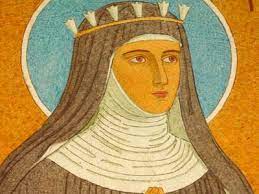Our series of blogs about women in classical music continues with the first known woman composer, Hildegard von Bingen. She lived 900 years ago and was an abbess, visionary, healer, poet, composer and saint.

Born in 1098 in Bermershein on the Rhine River in Germany, as was the custom of the day, as the 10th child in a noble family she was promised to the church at a young age. She spent 40 years at a hilltop monastery in Disibodenberg, Germany under the care of the Abbess there. In those 40 years she learned the Psaltery and prayed and fasted most days. It was not until the death of the abbess and Hildegard’s appointment as her successor that she began composing music for her fellow sisters to sing in services. Many of them were based on her own poetry which was said to be divinely inspired. Hildegard had since childhood had visions and it is said she was divinely instructed to write them down. Her work differs from normal chant or liturgical music of the time in that it is almost improvisatory in nature – she was never trained as a composer and so the melodic lines follow the inspirational nature of the texts. Most unusually for the time, she also had the favor and ear of the Pope and was advisor to several clerical dignitaries. Her theological book “Scivias” (Know the Way) was endorsed and blessed by the Pope. Hildegard died at the monastery in she had established near Bingen in 1179. Her work remained largely undiscovered until the 1970’s when women’s choral and Medieval and Renaissance performance groups released recordings of her pieces. Here are some examples of her work for your listening pleasure.
Anonymous 4 performs Veni Spiritus Eternorum
https://www.youtube.com/watch?v=ElnZI-XJ2hs
Kingdom of Navarre, Maite Itoiz & John Kelly perform Caritas abundat in omnia

